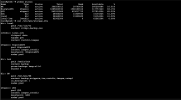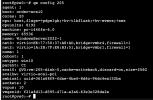Hello!
I have proxmox installed on DELL 730xd, with 2x Intel Xeon E5-2650 v3 and 512 gb ddr4 memory. I am looking forward to replace esxi with proxmox in the future but I need help with performance issues. The performance of Windows Server guest is very poor, and also LXC are not as quick as they should be. I had esxi installed here and it worked well, now I installed proxmox and got huge perfomance drop. What have I done wrong?
I have proxmox installed on DELL 730xd, with 2x Intel Xeon E5-2650 v3 and 512 gb ddr4 memory. I am looking forward to replace esxi with proxmox in the future but I need help with performance issues. The performance of Windows Server guest is very poor, and also LXC are not as quick as they should be. I had esxi installed here and it worked well, now I installed proxmox and got huge perfomance drop. What have I done wrong?



